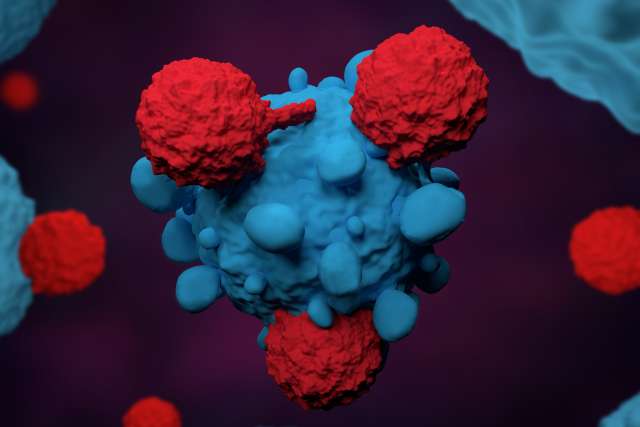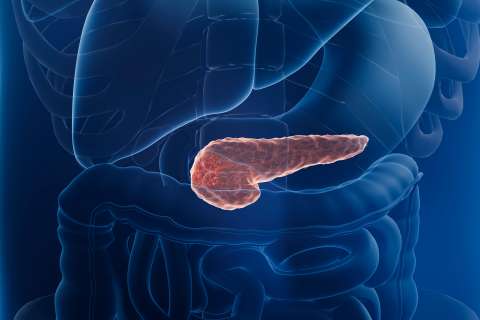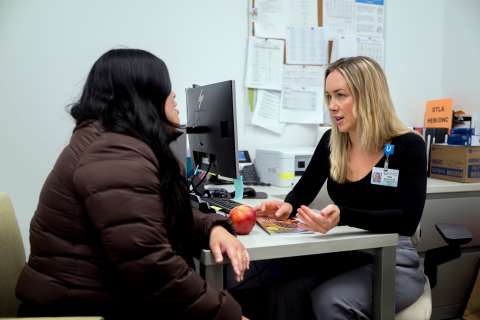In a first-of-its-kind clinical trial, UCLA scientists have shown it’s possible to reprogram a patient’s blood-forming stem cells to generate a continuous supply of functional T cells, the immune system’s most powerful cancer-killing agents. This approach suggests a new way to deliver immunotherapy, acting as an internal factory that produces tumor-targeting immune cells over time and potentially offering longer-lasting protection.
This early-stage study, published in Nature Communications and led by physician-scientist Dr. Theodore Scott Nowicki in collaboration with Dr. Antoni Ribas, Dr. Owen Witte, Dr. Donald Kohn, Dr. Lili Yang of UCLA, and Dr. David Baltimore from the California Institute of Technology, represents a novel strategy for treating hard-to-treat cancers, especially solid tumors that have proved to be more resistant to conventional T cell therapies.
Nowicki, assistant professor-in-residence of pediatric hematology/oncology and microbiology, immunology, and molecular genetics at the David Geffen School of Medicine at UCLA, and Ribas, professor of medicine and director of the tumor immunology program at the UCLA Health Jonsson Comprehensive Cancer Center, discuss the promise of this approach and its potential to transform cancer treatment and beyond.
What challenge in cancer treatment were you aiming to address by combining engineered T cells with genetically modified stem cells and how does this approach work?
Nowicki: We’re trying to address a problem that limits many current cancer immunotherapies for solid tumors, which is that they often work at first, but the benefit doesn’t last because the T cells we infuse eventually die off or become exhausted. The idea was to create a system where the patient’s own body can keep generating cancer-fighting immune cells over time—kind of like installing a permanent immune upgrade. That’s where the stem cells come in. If we can engineer a patient’s own stem cells to continually produce fresh, cancer-fighting T cells, we may be able to offer a much longer-lasting defense against the disease.
Ribas: We brought to the clinic preclinical research by Lili Yang and David Baltimore on how to regenerate a cancer-fighting immune system by genetically programming blood stem cells to become cancer-targeted immune cells. This is achieved by inserting cancer-specific receptors into the stem cells using gene therapy techniques, and then performing a bone marrow transplant to engraft the gene modified stem cells, which then produce the genetically-redirected cancer-fighting immune cells in the body of the patient.
You chose to target a specific cancer marker called NY-ESO-1. Why that one?
Nowicki: NY-ESO-1 is what we call a “cancer-testis antigen.” It’s found in a range of cancers, including melanoma and sarcoma, but it’s rarely seen in healthy adult tissues, which makes it a relatively safe target. That means the T cells we engineer can recognize and attack the tumor without harming the rest of the body.
You tested this approach in people with aggressive sarcomas. Why start there?
Nowicki: Sarcomas are rare, aggressive cancers that often express NY-ESO-1. In fact, about 80% of synovial sarcomas have the NY-ESO-1 tumor marker. Even after standard treatments like chemotherapy or surgery, the disease frequently comes back. And when it does, patients typically have very few options left.
What were the results in this first trial?
Nowicki: We saw that the engineered stem cells could successfully engraft in the patients and begin producing cancer-targeting T cells. One patient showed signs of tumor regression, and had detectable levels of these new immune cells for months. Importantly, we were able to visualize the stem cells in the body, showing they took hold. We essentially taught the body to grow its own supply of cancer-fighting T cells.
Ribas: This pilot study provided exciting evidence that the human immune system can be programmed to become cancer-focused by genetically engineering blood stem cells.
Might this kind of therapy end up being too complex or risky for most patients?
Nowicki: The early results are promising, but this is still experimental and not without risk. Right now, it’s definitely complex, but so were bone marrow transplants when they first started. This therapy involves stem cell collection, gene modification, and high-dose chemotherapy to prepare the body, all of which require time, expertise and a strong patient.
Could this strategy work for diseases other than cancer?
Nowicki: This strategy of using engineered stem cells to generate long-lasting immune responses isn’t just for cancer. In the future, we could use it to fight infections like HIV or even retrain the immune system in autoimmune diseases. Our cancer trial is a first step, but the potential is much broader.
What’s the most important thing people should take away from this study?
Nowicki: We’ve shown that it’s possible to reprogram a patient’s own stem cells to create a renewable immune defense against cancer. That’s never been done in humans before. It’s not a cure yet, and it’s not ready for widespread use, but it points to a future where we don’t just treat cancer—we prevent it from coming back.
Ribas: It took a team of more than 30 dedicated academic investigators and over a decade to bring to patients the concept of genetically programming the human immune system to result in a renewable source of cancer-targeted immune cells. The basic science principles had been established in preclinical models, and this study demonstrated that it is feasible to test them in patients with cancer.
The research was funded by the California Institute for Regenerative Medicine (CIRM), the National Institutes of Health, Hyundai Hope on Wheels, the Tower Cancer Research Foundation, the Parker Institute for Cancer Immunotherapy and Ressler Family Fund.
Additional authors of the study include Nataly Naser Al Deen, Cole Peters, Begoña Comin-Anduix, Egmidio Medina, Cristina Puig-Saus, Ignacio Baselga Carretero, Paula Kaplan-Lefko, Mignonette Macabali, Ivan Perez Garcilazo, Daniel Chen, Jia Pang, Beata Berent-Maoz, Salem Haile, Jonathan Rodriguez, Moe Kawakami, Conner Kidd, Ameya Champhekar, Giuseppe Carlucci, Agustin Vega-Crespo, Bartosz Chmielowski, Arun Singh, Noah Federman, Gary Schiller, Sarah Larson, Martin Allen-Auerbach, Alexandra Klomhaus, Jerome Zack, Lili Yang, Donald Kohn and Owen Witte, all from UCLA, and David Baltimore of the California Institute of Technology.
Nowicki, Ribas, Witte, Kohn and Yang are all members of the Eli and Edythe Broad Center of Regenerative Medicine and Stem Cell Research at UCLA and the UCLA Health Jonsson Comprehensive Cancer Center. Ribas is also the director of the Parker Institute for Cancer Immunotherapy Center at UCLA.








